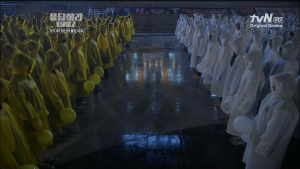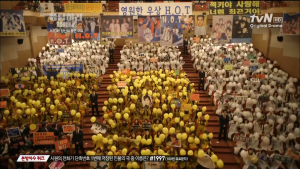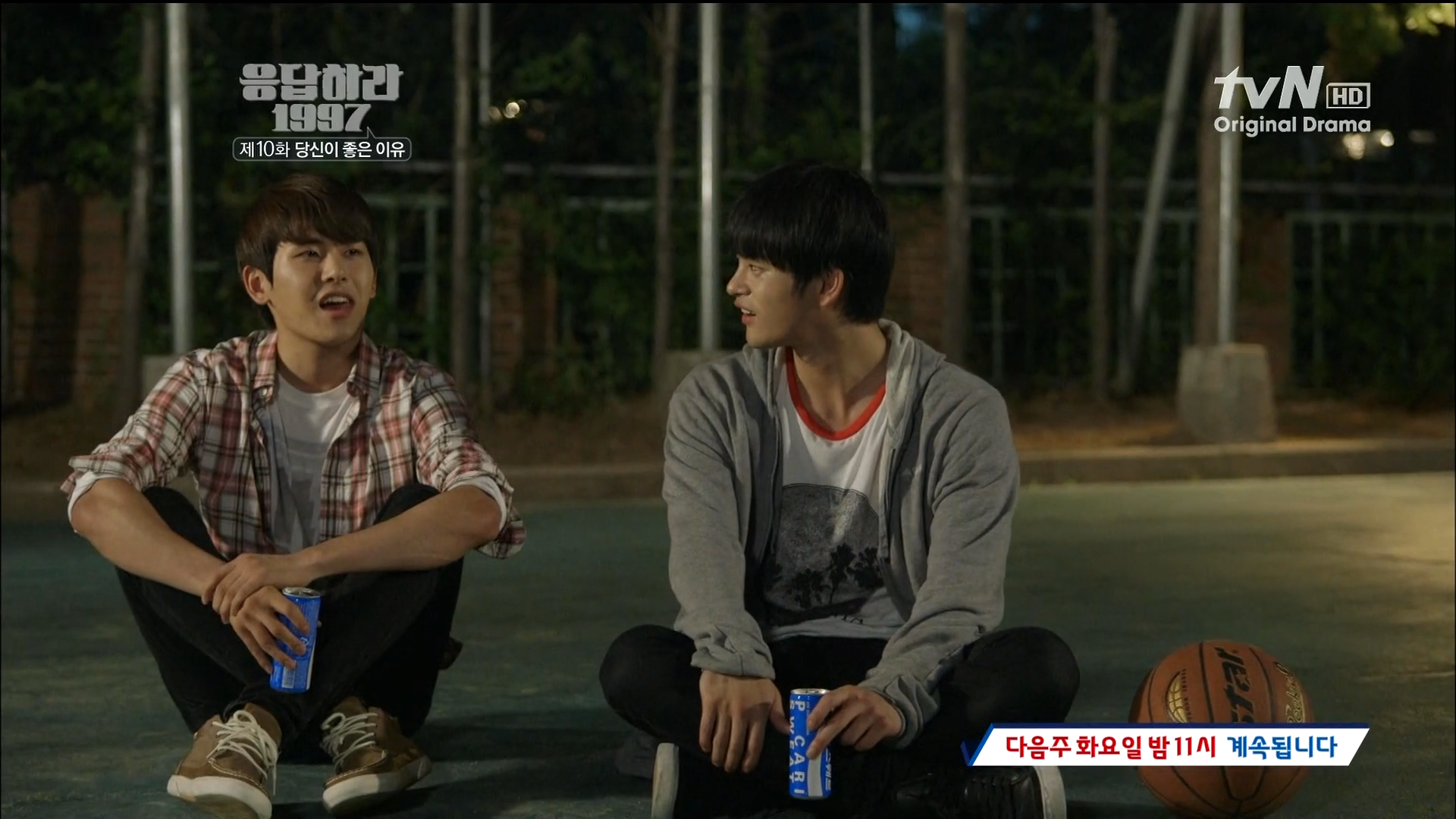The episode kicks off with the four boys, Yun-Je, Jun-hui, Hak-chan, and Seong-Jae, in front of a colatech (underage club). They enter the club and are later joined by Si-won and Yu-jeong. We see Jun-hui show off his dance moves on stage which gains him a Michael Jordon bag and prize money. Jun-hui offers to buy food with the prize money, but everyone has plans except for Yun-je leaving only the two of them together. They go to a street vendor which is run by Jun-hui’s 7th sister where they engage in an intimate conversation. During this time, they talk about personal stuff such as their family and their love problems. Jun-hui reveals the fact that he knows about Yun-je’s crush on Si-won and in return, Jun-hui is questioned who his crush is. Yun-je, unaware that he is Jun-hui’s crush, misunderstands that Jun-hui’s crush is Si-won.
Meanwhile, Si-won is busy indulging in her HOT fan activities. Its December 5th and the day of the 1998 Golden Discs Awards. In front of the theater, there is a sea of white and yellow. The fans of Sechskies and the fans of HOT both have high hopes their oppas; confident that they will win the award. Unfortunately for them, someone way out their radar wins the award. We have seen in prior episodes the clash between the fans of HOT and Sechskies. Does rivalry still exist between different fandoms today?
Here’s the song, Kim Joong Hwan’s “For Love” which trumped HOT and Sechskies.


Yun-je and Jun-hui are once again left only with each other. Jun-hui asks Yun-je why he likes Si-won. His answer to this question was quite simple, “Because she’s pretty.” This time, Yun-je asks Jun-hui why he likes Si-won. Jun-hui finally confesses he isn’t in love with Si-won but with him, Yun-je. A long silence runs after which Yun-je breaks the long silence by laughing.
In this episode, we finally see Jun-hui confessing his love for Yun-je. Lgbt is not commonly portrayed in Korean media. Why do you guys think the writer included a gay character in the story? During 1998, how was homosexuality viewed? Is there a chance Jun-hui would come out of the closet? Also, during the last scene, we see Si-won asking Tae-ung why he likes her. Tae-ung’s reply is more or less the same as Yun-je’s answer. Is it just me or do you guys also feel a bit disturbed that Tae-ung has a liking for Si-won? After all, Tae-ung was engaged to Si-won’s older sister.

Dohee
Hi Dohee! Thank you so much for the post and the song 🙂
To answer you question about the perspective of homosexuality in Korea, I think we can look to Bong (2008). He states that the end of the military authoritarian regimes in 1987 allows homosexuals to open up more. In this way, democratization aided the gay rights movement in Korea, allowing for higher degree of tolerance and protection of sexual minorities. Youn (1996) gives us a bit of historical background to gay organizations in the 1990’s. The first gay campus organization called “Come Together” emerged at Yonsei University on April 1, 1995. Following their successful start, another campus group “People with People” was established at University of Korea in September 1995. By 1996, there were at least 5 gay student organization at Korean universities. These gay organizations had a large membership. For example, the organization “Between Friends” recorded a member of 120 members by 1996. Youn, was asked to participate in a one hour TV program in the 1990s because she was a psychologist. This program featured Youn, a gay man who spoke of his experience, and the host. Youn recalls that the host of the program was sympathetic, allowing the the three of them to discuss antigay prejudice in detail. By outlining her experience in this TV show and giving examples of other TV programs, she explains that there have been several noble attempts in the 1990s to use mass media to portray homosexuality in a positive light. This is not to say that the majority of Koreans in 1990s accepted homosexuality. Like Yoon-Jae, most Koreans did not embrace homosexuality and would have found it disturbing to have a close guys friend like them. Even now, Koreans are largely homophobic. My point is that 1990’s was a time when Koreans were starting to very slowly accept different sexual interests. Hoya, in this case, represents the homosexuals in Korea in the 1990s who were stealthly rising to get their identities accepted and their voices heard.
Bong, Youngshik. “The Gay Rights Movement in Democratizing Korea.” Korean Studies 32, (2008): 86-103.
Youn, Gahyun. “Do Human Rights Exist for Korean Gay Men and Lesbians?” Paper presented at Stigma, Human Rights, and Sexual Orientation—International Perspective, Toronto, August 1996.
Hi Dohee, thank you very much for your post and for the synopsis. To address your question about rivalries today, I think rivalries still exist and arguably operate at a larger scale. In my comment for episode one, I pointed out that K-pop fans’ shared interest in an idol or idol group creates a community. This community is often put on the spot when their idols appear in music shows or awards ceremonies. It becomes an opportunity to express their devotion to the idol as well as show to the greater world (particularly the other fandoms) about how much they love their idol. In the drama we see fans do this by buying their merchandise and albums in addition to attending these shows.
We see this in the current day as well. We see headlines about how fans buy up tickets in minutes, how many views they get on their videos or how big of a venue a particular idol/idol group is performing in. I may be being cynical, but I believe that there is an implicit comparison being made when other fans read headlines like these. Fans’ actions equate their devotion to the particular idol. When they see how devoted other fans are in supporting their idol in droves, it makes their fandom seem inferior in comparison, which is why they need to one-up it to show that they care about their idol much more. The stakes are greater than in the past. Rivalries operate at a larger scale because of international fans and technological advances. There are many more people participating in it and at a faster speed. Unsurprisingly, there’s a heavy financial element in this, so we shouldn’t be surprised when executives like Yang Hyun-suk try to exploit this in various ways, such as when he overlapped comebacks in the case of 2ne1 and SNSD.
Take a look at this seoulbeats article that talks about fan rivalries: Seoulbeats. “Roundtable: K-pop Rivalries, Feuds, and Showdowns.” Seoulbeats. May 12, 2016. Accessed October 28, 2017. http://seoulbeats.com/2016/05/roundtable-k-pop-rivalries-feuds-and-showdowns/.
Hi Dohee thanks for your post. As for your question about why the writer included a gay character in the story, I think the reason for this is because the writer wanted to express the difficulty of someone who is gay to live during that era. We can see throughout the episodes that it is difficult for Joon-hee to confess to even his closest friends. During 1998 homosexuality similar to now is likely looked in a negative lens. There was never a o legal protection against LGBT discrimination in South Korea, and it is likely to continue in the future under president Mun Jae-In political tenure. During the 2017 presidential election, I remember watching a debate between Mun Jae-In and Hong Jun-Pyo, where president Mun Jae-In publicly say that he oppose gay people in the military as well as homosexuality it self. He also near the end of the video say that homosexuality should not be legalized in South Korea. The following video is the debate between the presidential candidates about homosexuality for people who can understand Korean.
For those who can’t, this CBC article summarizes the exact same debate during the 2017 Presidential Election http://www.cbc.ca/news/world/south-korea-presidential-debate-gays-1.4085893.
It was interesting how in previous episodes, Jun-hee planned to enter the Korean Air Force Academy despite him being gay. At the time and to this present day homosexuality is not legal in the South Korean military. If found that someone is homosexual through psychological tests for mandatory military service the person will likely be exempt and would be categorized as someone with a psychological disorder. In case you guys are wondering, the reason for why males do not use this mode despite how easy it would be to evade military service is because it remains on your public record and could negatively affect you in the future.
Lastly, this article by CNN is about how the South Korean military performed a ‘gay witch-hunt’ after the election of Mun Jae-In, to arrest soldiers who are gay and sentence them for their appropriate crimes. http://www.cnn.com/2017/06/11/asia/south-korea-lgbt-military/index.html.
Thanks for the post Dohee!
To answer your question on Tae-woong’s response towards Shi-won, I agree that it is a little disturbing with the predetermined knowledge; especially since the plot moves to show how Tae-woong sees Shi-won as a character that fills the void left by her deceased older sister, Seung-ju. At the same time, it could be seen as his main motive in romancing Shi-won since he is unaware of his brother’s love towards her as well.
By showing how both brothers give the same response, the audience may understand their connotations in different ways. In the case of Yun-je, a long time childhood friend that has lived with her for so long and has experienced all the ups and downs of her life, his iteration of “because she’s pretty” could be the summation of the now matured feelings he has for her seeing as they both grew up in the same household. On the other hand, Tae-woong, being the overseeing guardian for Yun-je and Shi-won has had the opportunity to see her mature into a resemblance of his past fiancé. In my opinion, Yun-je’s love for Shi-won could be seen as newfound and freshly developed over the years of living with her whereas Tae-woong’s feelings towards her come off as more of finding a suitable replacement of the past, to bring himself closer to his past status quo.
While both reasons for liking Shi-won are valid, we would just have to wait until the drama unfolds further to get some closure on this love triangle.
It is also interesting to see how the show pushes the ‘perfect man’ narrative of Tae-woong and Yun-je being the one who is always a step behind. An article I came across highlights a translation from a Korean article about their ideals of the ‘perfect man’. Give this a read if you have time 🙂 http://www.eatyourkimchi.com/ideal-korean-man/
Thanks for the post Dohee! This episode is definitely one of the more stimulating episodes in my opinion.
Including a gay character in the story is definitely a bold move by the writers for several different reasons. Firstly, LGBT rights and protection remains to be scant in South Korea. As mentioned by Edward, the current president Moon Jae-in is openly against homosexuality, thus Korea has not made much progress in recognizing LGBT persons, and remains to be a taboo subject. Secondly, LGBT representation in South Korean popular media is also rare because of its opposition in larger society. There are previous attempts of including LGBT characters in dramas, such as Life is Beautiful in 2010 that focused on a gay couple, but show faced severe backlash. The producers and writers’ conscious decision to include a gay character (or someone who is discovering their sexuality) is definitely out of the norm, thereby making its inclusion significance. Whether Joon-hee will come out of the closet and explicitly announce his sexuality is still uncertain. Lastly, it is atypical to cast an idol like Hoya to play such a controversial role, especially for their acting debut. Idols generally must maintain a “squeaky clean” image that is appropriate for all audiences, but particularly adolescent/teen fans. Venturing into controversial roles is a huge risk for idols that may jeopardize their careers and elicit a response from fans.
And NO, you are not the only weirded out by Tae-woong and Shi-won’s relationship! Aside from the fact that Tae-woong was once engaged to Shi-won’s older sister, there is a prominent age gap between Tae-woong and Shi-won, and most importantly… Shi-won is still a minor. She is also technically his student.
Dohee, great job setting up the discussion with lots of good questions.
연실, great reply. Nice use of the literature, too.
예찬, awesome. ‘implicit rivalry’ — perfect!!! Nice bringing in a reference, even if it’s just a blog.
Edward 규훈, great job bringing in current events and the president. Wonderful.
*totally loving this whole discussion, where i see y’all as so smart and teaching each other so beautifully*
Raymond, nice job responding to the question of whether Tae-ung and Siwon, as a couple, is disturbing.
Kelly, good job bringing in other dramas, like Life is Beautiful. However, both you and Edward need to be careful about saying the president is anti-gay. He carefully made a point about his own beliefs, but did not go so far as to say that LGBT is ‘bad’ or something like that. I personally think he was trying to walk a line between his own beliefs and being too liberal to get elected. (As much as I am pissed he ever said that in debate).